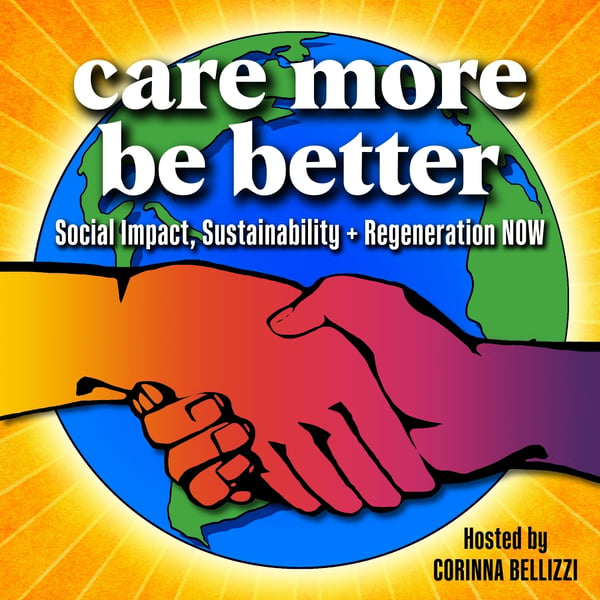THE TRUE COST OF FOOD: A Case For Hyper-Regional Food Production
Care More Be Better: A Podcast For Sustainable Social Impact and Regeneration
Corinna Bellizzi
5 • 1.3K Ratings
🗓️ 6 October 2024
⏱️ 64 minutes
🧾️ Download transcript
Summary
The true cost of food is something that we all need to be more concerned with, given rising temperatures, worsening weather, and growing populations around the globe. How much did your food cost in terms of water, energy, transportation, and waste? This topic is top of mind for many reasons this week. If you've heard it before, I encourage you to listen again, while truly thinking about what your favorite meal's true cost really is.
Corinna Bellizzi, show host, is presently in her first course in a PhD program in sustainability at Prescott College. As the episode commences, she shares her present lens, and why she's chosen to re-share this episode, originally published on November 8, 2023. She invites you to think about your favorite meal and its true cost as you listen to today's episode. She also encourages you to reach out via email, or message on social channels. Feel free to complete the contact form to reach her directly. Just visit https://caremorebebetter.com
Marc Plinke is an inventor-innovator who started his career as a chemical and process engineer at the makers of Gore-Tex, a fabric you've all used in rain jackets. When he landed in Boulder, Colorado, he retrofitted his family's 1960s ranch house into a Beyond Net Zero Energy home. That experience led him to his second career in green building design. He spent the past decades applying his engineering mindset and expertise to building better greenhouses. Mark started Ceres Greenhouse Solutions with the intention of enabling people to grow their own food sustainably and year-round. His passion is his family, beliefs and leaving the world a better place for his kids and all of ours.
JOIN OUR CIRCLE. BUILD A GREENER FUTURE:
🌴 Subscribe to our newsletter, and we'll plant a tree in your honor! https://caremorebebetter.com
🌲 Subscribe and rate us wherever you listen, and we'll plant another tree
🌳 Shop our cause-before-commerce store and support earth-first charities through our partnership with 1% For The Planet.
Follow us on social media:
YouTube: https://www.youtube.com/c/caremorebebetter
TikTok: https://tiktok.com/@caremorebebetter
Instagram: https://www.instagram.com/CareMoreBeBetter/
Facebook: https://www.facebook.com/CareMoreBeBetter
LinkedIn: https://www.linkedin.com/company/care-more-be-better
Transcript
Click on a timestamp to play from that location
| 0:00.0 | Hey friends. Over the course of the last seven weeks, I've been deep in my first PhD course at Prescott |
| 0:06.4 | College. We're focused now on the topic of sustainability and principles and practice. And our final |
| 0:13.5 | project for this term focuses on an attempt to understand the true cost of food on your plate. |
| 0:22.3 | Now, the true cost of food on your plate. Now, the true cost of food is defined through an understanding of its total footprint, |
| 0:29.0 | and that's from the water used to grow it, clean it, and process it, to the energy |
| 0:34.1 | that is used to even grow it or transport it or anything, to its transportation, |
| 0:42.2 | to its waste. So how many gallons did your dinner take to grow? Clean, process, and end up on your |
| 0:50.5 | plate. How much energy was required to create the meal? How many miles did it travel? |
| 0:57.5 | Was it by plane, train, boat, or truck? Combination is my bed. How much food waste did you create |
| 1:05.6 | in preparing it? How much packaging was included? Was it recyclable or compostable? |
| 1:13.1 | These questions and more abound, |
| 1:16.3 | and it's really what got me thinking about the true cost of food |
| 1:20.1 | that related to this episode with Mark Plinke. |
| 1:26.2 | Now, I'm sharing this interview from start to finish with all of this in mind. |
| 1:31.5 | I really think that you'll enjoy it, just thinking from this simple perspective of what is the |
| 1:37.4 | true cost of food on our plate and how might we minimize that? |
| 1:41.7 | Is it one part saying goodbye to packaging, and perhaps even one part growing |
| 1:47.4 | some of our own? Shopping for produce at farmers markets? Committing to buying foods that are in season, |
| 1:55.5 | as opposed to those that aren't, so we minimize their footprint. As we think about all of this, I also wonder if I could ask you a simple question. |
| 2:07.1 | Think about this. |
| 2:08.3 | Think about what your favorite meal is. |
| 2:12.1 | And if you were to picture that favorite meal, do you think that it's eco-friendly? Do you believe that it doesn't have a huge |
... |
Please login to see the full transcript.
Disclaimer: The podcast and artwork embedded on this page are from Corinna Bellizzi, and are the property of its owner and not affiliated with or endorsed by Tapesearch.
Generated transcripts are the property of Corinna Bellizzi and are distributed freely under the Fair Use doctrine. Transcripts generated by Tapesearch are not guaranteed to be accurate.
Copyright © Tapesearch 2025.

